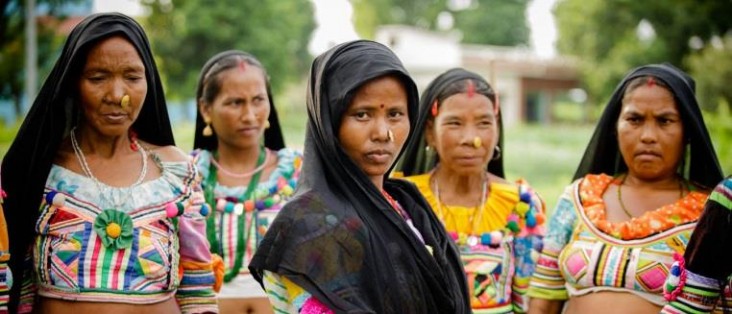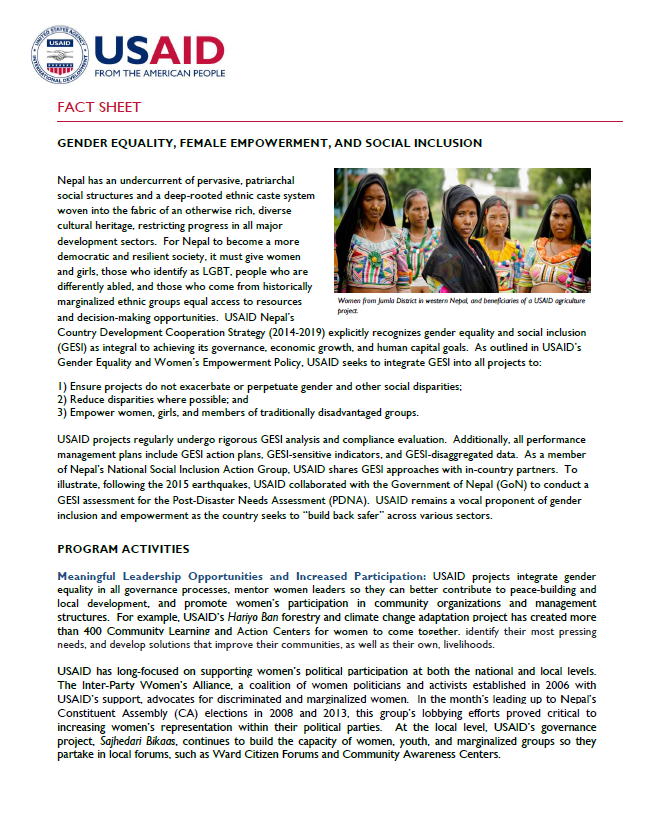
Nepal has an undercurrent of pervasive, patriarchal social structures and a deep-rooted ethnic caste system woven into the fabric of an otherwise rich, diverse cultural heritage, restricting progress in all major development sectors. For Nepal to become a more democratic and resilient society, it must give women and girls, those who identify as LGBT, people who are differently abled, and those who come from historically marginalized ethnic groups equal access to resources and decision-making opportunities. USAID Nepal’s Country Development Cooperation Strategy (2014-2019) explicitly recognizes gender equality and social inclusion (GESI) as integral to achieving its governance, economic growth, and human capital goals. As outlined in USAID’s Gender Equality and Women’s Empowerment Policy, USAID seeks to integrate GESI into all projects to:
1) Ensure projects do not exacerbate or perpetuate gender and other social disparities;
2) Reduce disparities where possible; and
3) Empower women, girls, and members of traditionally disadvantaged groups.
USAID projects regularly undergo rigorous GESI analysis and compliance evaluation. Additionally, all performance management plans include GESI action plans, GESI-sensitive indicators, and GESI-disaggregated data. As a member of Nepal’s National Social Inclusion Action Group, USAID shares GESI approaches with in-country partners. To illustrate, following the 2015 earthquakes, USAID collaborated with the Government of Nepal (GoN) to conduct a GESI assessment for the Post-Disaster Needs Assessment (PDNA). USAID remains a vocal proponent of gender inclusion and empowerment as the country seeks to “build back safer” across various sectors.
PROGRAM ACTIVITIES
Meaningful Leadership Opportunities and Increased Participation: USAID projects integrate gender equality in all governance processes, mentor women leaders so they can better contribute to peace-building and local development, and promote women’s participation in community organizations and management structures. For example, USAID’s Hariyo Ban forestry and climate change adaptation project has created more than 400 Community Learning and Action Centers for women to come together, identify their most pressing needs, and develop solutions that improve their communities, as well as their own, livelihoods.
USAID has long-focused on supporting women’s political participation at both the national and local levels. The Inter-Party Women’s Alliance, a coalition of women politicians and activists established in 2006 with USAID’s support, advocates for discriminated and marginalized women. In the month’s leading up to Nepal’s Constituent Assembly (CA) elections in 2008 and 2013, this group’s lobbying efforts proved critical to increasing women’s representation within their political parties. At the local level, USAID’s governance project, Sajhedari Bikaas, continues to build the capacity of women, youth, and marginalized groups so they partake in local forums, such as Ward Citizen Forums and Community Awareness Centers.
Building a Skilled, Literate Population: USAID supports the Ministry of Education’s National Early Grade Reading Program, and promotes parental support for children’s education, particularly girls, so they are elevated and on equal footing with boys. The program is working with children across the country in grades one through three, with a focus on building the reading and comprehension skills of boys and girls.
Prevention, Protection, and Prosecution against Trafficking: USAID’s projects protect vulnerable youth and women from trafficking, ensure that trafficked survivors have safe refuge, and provide legal and social services to victims. USAID projects also train judicial and security officials to prosecute traffickers. As a result, there have been 48 convictions since 2011, including three landmark cases. In six earthquake-affected districts, USAID expanded psychosocial support services to mitigate increased risks for trafficking and gender-based violence (GBV) related to economic instabilities.
Reducing Gender-based Violence through Partnerships: USAID and its partners support awareness-raising campaigns and events, like the16 Days of Activism against GBV, to enhance the inclusion and protection of vulnerable groups, and encourage solidarity and public discourse. As part of the Sajhedaari Bikaas project, GBV victims are encouraged to use a Short Messaging System to report conflict incidences, and USAID’s Saath-Saath partner works with local HIV and AIDS NGOs to build their capacity to provide GBV prevention and mitigation services to female and transgender sex workers.
Economic Growth through More Meaningful Opportunities: Male outmigration from Nepal’s rural areas often creates tremendous vulnerabilities for the women they leave behind. USAID’s livelihood projects specifically work to correct this imbalance, and empower women and marginalized groups with the means and knowledge to support themselves. For example, thirty percent of the total beneficiary households reached by USAID’s Knowledge-Based Integrated Sustainable Agriculture and Nutrition Project (KISAN) are woman-led households involved in commercial farming. KISAN works to increase female farmers’ access to village and community funds; trains women and marginalized people on literacy, numeracy, and entrepreneurship as part of the Business Literacy Program; and helps female farmers better manage and improve agriculture-based incomes. Additionally, KISAN facilitates increased agricultural productivity and access to markets by providing agriculture inputs like governmentapproved seeds, fertilizers, and small-scale technologies.
Healthier, Stronger Communities: Active in 41 out of Nepal’s 75 districts, USAID’s Integrated Nutrition flagship project, Suaahara, improves the health and nutrition status of pregnant and lactating women, as well as children less than two years old. Suaahara families receive nutrition counseling and support to plant small, diversified homestead gardens; access animal source protein through chicken breeding; learn the importance of a skilled birth attendant, the healthy timing and spacing of pregnancies, and exclusive breastfeeding; and improve hand washing techniques and proper solid waste disposal. The cumulative effect of these interventions is creating sustainable, long-term extreme poverty reduction through decreasing chronic undernutrition. USAID’s Health for Life project is facilitating the implementation of the GoN’s GESI directives to increase access to life-saving health services for marginalized communities. USAID continues to support the National Female Community Health Volunteers – a cadre of 52,000 trained volunteers – who help empower local women with a basic knowledge of primary health care, and educate communities about healthy behaviors. These volunteers are responsible for many of Nepal’s successes in reducing child and maternal mortality.








Comment
Make a general inquiry or suggest an improvement.